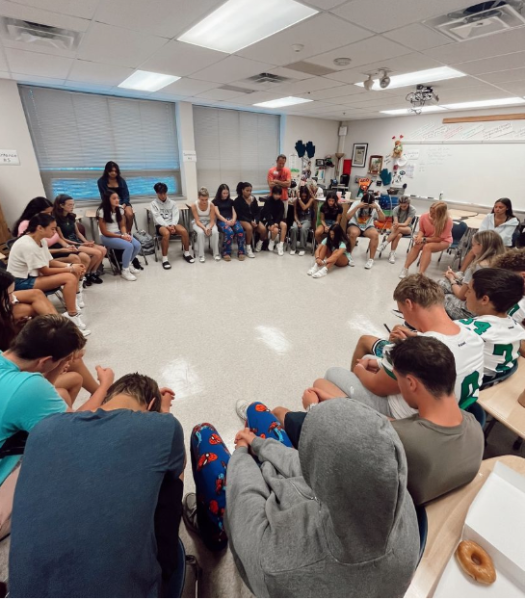IB Survival Guide
The International Baccalaureate (IB) Programme can seem daunting to rising Juniors who either don’t understand the programme or don’t feel prepared to take on its challenges. However, many students still choose to pursue these classes, and potentially the IB diploma, and have developed their own methods to combat the madness.
IB Requirements
Before jumping into ways to navigate IB we must first understand the programme and its requirements. One of the perks of taking all IB classes is receiving your IB diploma, which helps colleges determine placement and credit. This is known as IBDP (Diploma Programme), however, not all IB students are aiming for this goal and instead take the route of IBCP (Career-Related Programme). The Career-Related Programme means taking a minimum of 2 IB classes, a two-year career related study, and a reflective project on an issue from their career-related studies. However, if neither of those interest you, you can simply do the classes and still receive college credit.
Another piece of IB is the distinction between SL (standard level) and HL (higher level). As the names suggest, standard level has fewer requirements than higher level, however before you graduate you will need a total of 3 SL and HL exams or rather 2 SL and 4 HL. The requirements for IBDP in 11th grade are as follows:
- Begin Theory of Knowledge course
- Begin 4000 Word Extended Essay
- 150 Hours CAS (Creativity, Activity, Service)
- Up to 2 SL exams
The requirements for IBDP in 12th grade are as follows:
- Complete Theory of Knowledge course/paper
- Complete Extended Essay
- 1-2 SL exams
- Take 3 HL exams
As intense as this might read, the workload is dispersed over 2 years is achievable with the proper planning and time management
Time management
As cliche as it may sound, managing your time is crucial when preparing for extensive coursework. If you’re someone who struggles with balancing their time or remembering assignments, it’s important to have a few tools to help yourself in these classes. For instance a daily schedule can prove to be useful and will help you develop an internal clock and good habits. A schedule should also include periodic breaks. Pacing yourself helps alleviate burnout and a poor work ethic. Stick to that daily schedule, whether it be bedtime, homework, or routine.
Having an Outlet
As you are scheduling when you should be working, it is critical that you pursue other non-school related activities. Drawn out attention towards a single task can decrease the quality of your work. According to DeskTime, an employee productivity tracking software, the most productive people work for 52 minutes and break for 17 minutes. According to Liberty University, “Having a creative outlet helps you deal with anxiety and stress, gives you a sense of purpose, and helps make space to overcome obstacles.” Some students read or write, some paint, some bake – the possibilities are endless.
Be Two-Steps Ahead
In IB due dates are crucial, and while there is some give depending on your situation, you should always strive to be ahead on your work. Do homework when it’s assigned, ask questions when you have them and study for tests. IB students who can’t keep up with their courses usually don’t understand the material or fail to turn assignments in on time. Many IB students struggle to ask for help, but receiving help from your teacher or a tutor will only benefit you in the long run.
Furthermore, you’ll have to be thinking about your essay and exams: it’s better to get the jump on either writing or studying before it’s too late. The quality of your work will show and impact your grade, so don’t leave it until the last minute.
Breathe
Stress can be a good motivator, however, too much stress can be unhealthy. Just remember to breathe! Your teachers are on your side and want you to succeed, so don’t be afraid to reach out if you’re struggling. IB is meant to help you grow – if you feel yourself diminishing, talk to a teacher or trusted adult. There is no shame in receiving help or, if it comes to it, dropping down a class. Taking on a level of work you’re not ready for isn’t going to help you the way it should, and that is what going to school is about. So just take that deep breath and know that there are people in your corner.
Grayson Quigley is a Junior at South Lakes and a first year journalism student. He’s excited to join the Sentinel as a Staff Writer. He enjoys reading...














Caitlin Quigley • Sep 9, 2022 at 2:44 pm
VERY COOL AND AWESOME SO PROUD!